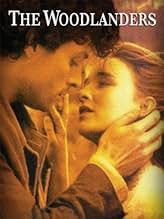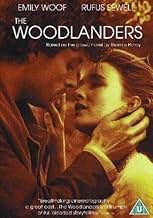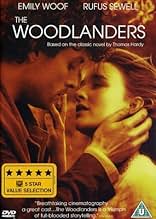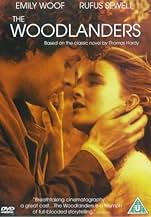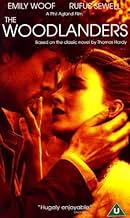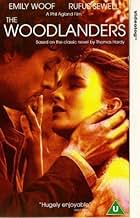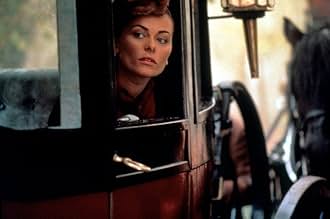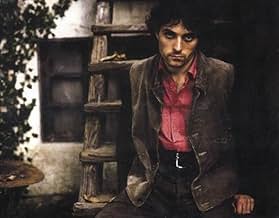Füge eine Handlung in deiner Sprache hinzuThe story is set in late 19th century rural corner of South England. The daughter of timber merchant Melbury, Grace, returns to the town after finishing school. Her father now believes she c... Alles lesenThe story is set in late 19th century rural corner of South England. The daughter of timber merchant Melbury, Grace, returns to the town after finishing school. Her father now believes she can find a better husband than her childhood sweetheart, woodsman Giles. She marries handso... Alles lesenThe story is set in late 19th century rural corner of South England. The daughter of timber merchant Melbury, Grace, returns to the town after finishing school. Her father now believes she can find a better husband than her childhood sweetheart, woodsman Giles. She marries handsome young doctor FitzPiers, but soon finds out he's not the man of her dreams and she still... Alles lesen
- Auszeichnungen
- 3 Gewinne & 1 Nominierung insgesamt
Empfohlene Bewertungen
Performance-wise the cast is well-chosen, with gorgeous Rufus Sewell in the lead role as the brooding woodman Giles, who keeps his feelings for the now-better-than-he Grace (Emily Woof) to himself; as Fitzpiers, Cal Macaninch makes the character just as unsympathetic as he was in print (a close cousin to the Brontes' Edgar Linton is this starchy doctor). Jodhi May completes the mix as Marty, the village girl who remains doggedly devoted to Giles.
The countryside is photographed well but the momentum lacks the cinematic scope which would have made this a truly interesting film.
George Fenton's music score has a lot of beautiful sweep and passion, underlying the tragedy of the story convincingly but not obviously, unsurprising seeing as Fenton's music has always had that effect, while the script is literate and true in spirit to Hardy's prose. The story may lack the depth of the book and the beginning and end have pacing lulls, however it is still told beautifully and compellingly with faultless mood contrasts, and deserves further credit for matching the slow but spacious pacing of the book, handling the romance subtly, the rural if at times gloomy atmosphere it evokes and for how well it makes an effort to convey how the characters would interact, speak and behave. Phil Agland does a solid job directing, really not bad for a feature film debut. Rufus Sewell is a smouldering and affecting Giles, the character we feel the most for. Emily Woof's Gracie is luminous and strong-willed as well as equally touching, it's a different character for her and she acquits herself very well. Cal Macaninch is suitably sly and snobbish, while Polly Walker makes a sinister impact, Jodhi May is a sympathetic Marty South(more so than in the book) and Tony Haygarth makes for a very ideal father-figure, of the firm yet warm and well-intended kind. All in all, falls short but it is well made and earnestly done. 7/10 Bethany Cox
I cannot agree with comments made concerning the scenes dragging or the film itself lacking cinematic scope. Some critics have taken this view but I believe this is rather an indication of how susceptible critics can be to saying what they think people will expect them to say (whilst conveying the distinct impression that they are the most bravely objective critics in the world).
No, this is a film which refuses to go at the pace expected of it but, rather, courageously moves at the precise pace demanded of it by the overall direction and approach. I am glad I haven't read the book because it might have tempted me to try to make a like-for-like comparison and thereby go on to make erroneous deductions.
The two mediums, film and literature, demand different approaches and, to me anyway, this thoughtfully filmed tale is at ease with itself and that is all we can ask of it. It is not trying to be Gone With The Wind or even Pride and Pejudice, nor should it make the attempt.
Like Bleak House, it will completely glide past the attention span of the viewer who is anxious for untimely progression or who is not mentally prepared for its purposely ponderous and understated theme. What I would suggest, most humbly, is that anyone with doubts set aside a whole evening with nothing else planned and no interruptions possible. Then forget anything you have previously experienced concerning this tale and view it afresh. Put away any cynical prejudgement and consciously assume that the film's understated acting is fully intended as such. Then I believe your experience and enjoyment of this film will improve no end.
The director was no doubt under immense pressure to make this tale more paced and juicy. I, for one, fully commend him for resisting this and producing a magnificently restrained U film, a truly English shared countryside, domestic and subtly romantic experience - at least for anyone allowing it the space to embrace them. VNP.
The Woodlanders are the inhabitants of a small village. Country folk Grace Melbury (Emily Woof) and Giles Winterborne (Rufus Sewell) were childhood sweethearts but when Grace comes back from boarding school, she finds herself unable to mix with Giles and the other villagers. Her father (Tony Haygarth) encourages her to marry new doctor Eldred Fitzpiers (Cal Macaninch) who is more befitting of her new educated self. However Fitzpiers cannot cope with mixing with the woodlanders, and Grace's heart pangs for Giles once more.
There are two things Thomas Hardy is famous for: gloomy fate and Wessex, a fictional version of South West England. The third thing that he should be famous for is romance. The film is achingly romantic as everybody pines for the person that they cannot have. There's a secondary character who is also in love with Giles- odd reclusive Marty South (Jodhi May), who shares Giles' passion for nature. I would like to have seen more of her character but maybe that would just add to the aching tragedy of it all.
Apart from the tragic finale, the gloomiest moment has to be when Giles' house gets demolished and Mrs Charmond (Polly Walker), a wealthy patient with her eye on Fitzpiers, complains that his house is blocking the road- cue a shot of a rotting pile of wood.
In a sense, the film is a bit like Marty South: odd, obscure, slow and innocent. The slow pace works in a sense as you soak up all the beautiful cinematography and the gorgeously tragic score. Characters never have massive rages of passion- in that sense, it's a little bit like Chekhov. Life, miserable as it is, goes on.
All of the characters are sympathetic, even Dr Fitzpiers. Macaninch's performance is enigmatic: on one hand, Fitzpiers is a cruel and adulterous snob; on the other, he's a man of science who just doesn't understand the old-fashioned ways of the country people. Grace's father does her the most harm, forcing her to better herself because of his own feelings of inferiority, and yet Haygarth gives a warm and touching performance.
As the leads, Woof is adorably childlike as Grace and Sewell makes for a nice simple countryman. The film- I don't know the novel- is all about simplicity and innocence. The world of sexual desire is not present here, making the intrusion of Mrs Charmond all the more unpleasant. Her garish red dress is completely out of place in the charming pastel attire of the villagers and one longs for her and Fitzpiers to leave so we can hang forever in that wonderful idyll.
My criticism would be that they could have fitted more in. The film seems to touch on the novel rather than portray it, and maybe a more conventional dramatic pace might have helped there. Maybe more probing of the social issues would have been good- really, just more of everything.
This is definitely a Sunday afternoon film- a slow languid weepy, just like the good old days, that you can watch with anyone of any age. But to be honest, it's the perfect film to watch on your own as you allow it to wash over you.
The story is faithful to the book, but omits some of the peripheral details. It's about a young woman who returns to a close knit woodland community after several years away. In that time, she has become an educated lady, and she finds it quite difficult to relate to the people she once grew up with, having experienced wider and more varied cultures. Her childhood sweetheart is a simple woodcutter, and she feels that she is now too "good" for him, so she forsakes her fondness for him and marries a wealthy and educated doctor, with tragic consequences.
The film was filmed in the New Forest (a gorgeous area of England) and it is a visual treat from first frame to last. The scenery is simply ravishing. Furthermore, the performances are very thoughtful and persuasive, complementing the sharp and carefully worked out script. This is definitely one of the best adaptations of a Thomas Hardy novel, and it can stand alongside Polanski's Tess and Schlesinger's Far From the Madding Crowd with its head held high.
Wusstest du schon
- WissenswertesFinal film of Sheila Burrell .
- Zitate
Marty South: Oh, Giles, if only you could tell your heart to be free.
Giles Winterbourne: You can't tell the heart. The heart hopes. Most of all where it's hopeless.
Top-Auswahl
- How long is The Woodlanders?Powered by Alexa
Details
- Laufzeit
- 1 Std. 38 Min.(98 min)
- Sound-Mix
- Seitenverhältnis
- 2.35 : 1

